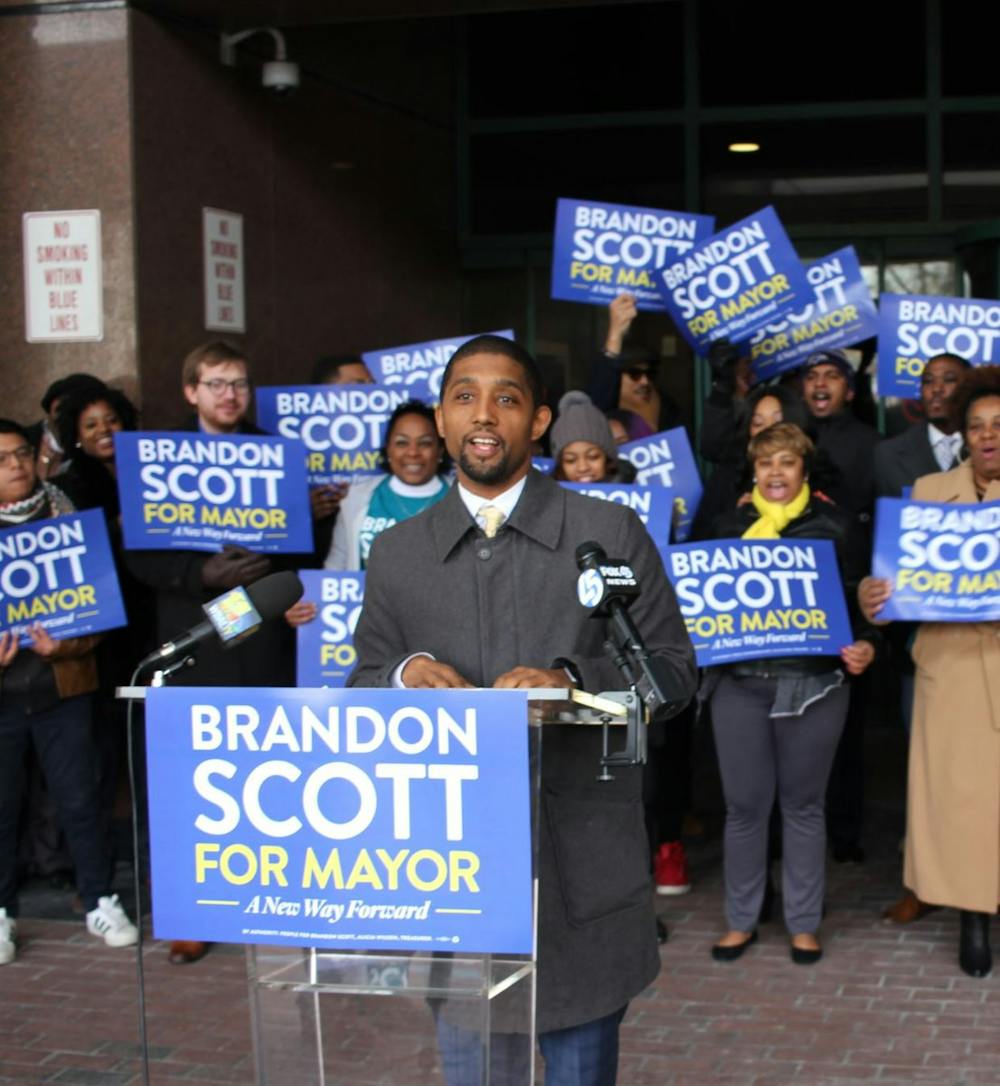Democrat Brandon Scott, president of the Baltimore City Council, was elected to be the city’s 52nd mayor on Nov. 3. Succeeding Bernard C. “Jack” Young, Scott, at age 36, will become Baltimore’s youngest-ever mayor. He will be officially sworn into office on Dec. 20.
With a total of 118,621 votes, Scott garnered 51.3% more of the votes than his main opponent, Independent nominee Bob Wallace. Republican nominee Shannon Wright and Working Class Party nominee David Harding followed Wallace in number of votes received.
After receiving a concession call from Wallace, Scott declared his victory and thanked his supporters.
“Baltimore, our city has voted for a new way forward,” Scott said. “I stand before you tonight, a son of Baltimore and the next mayor of our great city. I am so proud, energized and humbled by your belief in me and what we can accomplish together.”
Scott was the youngest candidate in the race for mayor and, nine years ago, was the youngest person to be elected to the City Council at age 27. He was elected council president in May 2019 after Young became mayor following former Mayor Catherine Pugh’s scandal and resignation.
Throughout his campaign, Scott, a Park Heights native, was favored to win the mayoral race after winning the Democratic primary on June 9.
Junior Ryan Ebrahimy, co-president of College Democrats at Hopkins (HopDems), was a campaign intern for Baltimore First District City Councilman Zeke Cohen, who endorsed Scott. Ebrahimy noted that he was not surprised by Scott’s win because Baltimore is considered a liberal city.
“I was more surprised in the primary earlier in the year when it was a much more packed and competitive race, so it was very exciting to see him win then” he said. “Once he became the Democratic nominee, the general consensus was that he would easily be elected as mayor.”
Scott, who formerly served as the chairman of the City Council’s Public Safety Committee, centered his platform on reducing crime and violence in the city, increasing government transparency and supporting citizens of Baltimore through the COVID-19 pandemic.
Bill Henry, a close ally to Scott, was elected to be the city’s comptroller on Nov. 4. He has also pledged to work toward bringing more transparency to his role.
The Baltimore City Council will also remain completely Democratic after five new members were elected to the 14-member council on Nov. 4.
During his victory speech, Scott called for unity among the public to address the city’s issues and renew society.
"I see this as the opportunity for rebirth. The rebirth is going to come when we all have to work together each and every day and do that tough work to make Baltimore a better place,” he said. “I am not the savior. One person cannot fix problems that have existed longer than I have been alive.”
Sophomore Isabel Veloso, a resident of Baltimore, voiced her excitement about Scott’s plans to reduce gun violence.
“Gun violence is a big thing he should be and is working on,” she said. “He has enacted a lot of policies to curb gun violence in Baltimore and provide better ways of living for young people affected by gun violence.”
Sophomore Emilia Ochoa, communications chair of HopDems, also expressed her hope in Scott to effect substantial change in the city. She noted that Scott has lived in Baltimore his entire life and is very energetic.
However, Ochoa believes that it is too early to tell what his tenure as mayor will truly bring.
“With any politician in the past, so many of them have had scandals or have been corrupt,” she said. “It’s always a concern because that seems to be such a trend, but I do have hope that he won’t be like that.”
Veloso hopes that Scott will also focus on police reform. She explained that the Baltimore Police Department has struggled to control and maintain officers due to the stigma that has developed against police officers.
“Something like police reform cannot come from within the police department, and Mayor Scott brings that perspective since he’s from Baltimore and knows how the city works,” she said. “He’s very in touch with the community. He’s very accessible and that will be a great benefit to the city.”
Ochoa stressed that police reform must be addressed immediately once Scott begins his term, citing the Black Lives Matter protests sparked by George Floyd’s death at the hands of the Minneapolis Police Department.
According to Ebrahimy, Scott must also focus on improving public transportation and making Baltimore a more sustainable city.
“Recognizing that accessible transportation as a really important vehicle for economic growth is really important,” he said. “In regards to improving Baltimore as a sustainable city, he needs to work to orient the city so it is best prepared to deal with the effects of climate change and mitigate greenhouse gas emissions.”
Veloso summarized the actions she hopes that Scott will take once he begins his term.
“Definitely gun violence programs, more support for housing programs, focusing on COVID-19 and emphasizing public health,” she said. “He’s already created the Baltimore COVID-19 asset maps that shows a list of testing sites, which is a big step.”
Chris H. Park, the vice president of HopDems, is a News & Features Editor for The News-Letter. He did not contribute reporting, writing or editing to this article.





